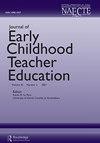Supporting the participation of autistic children: development, acceptability and feasibility of an intervention to build capacity of early childhood educators
IF 1.3
Q3 EDUCATION & EDUCATIONAL RESEARCH
Journal of Early Childhood Teacher Education
Pub Date : 2023-05-09
DOI:10.1080/10901027.2023.2211945
引用次数: 0
Abstract
ABSTRACT When early childhood educators include autistic children, they require information about these children’s needs and strategies to promote their participation in daycare activities. As there are many ways to build educators’ capacity, these key individuals for inclusion should be considered to offer interventions relevant to their context. This study aimed to develop an acceptable and feasible intervention to build educators’ capacity to facilitate the participation of autistic children with reactions to sensory stimulation in their daily routine. The person-based approach was used to guide the development and evaluation of the intervention. Based on three guiding principles (i.e. efficiency, flexibility, and clarity and usefulness), the intervention included two steps: 1) educational videos and 2) coaching meetings. Interviews with six educators revealed the intervention was generally appreciated and easy to implement in the daycares. Even though flexibility was perceived as meaningful, sufficient time should be recommended between each session to allow reflection and collaboration with colleagues should be supported. The possibility to validate educators’ observations or strategies identified came out as significant in addition to promoting their sense of efficacy. The combination of two types of capacity-building intervention contributed to the feasibility and acceptability of this intervention in early childhood daycares.支持自闭症儿童的参与:幼儿教育工作者能力建设干预措施的发展、可接受性和可行性
本文章由计算机程序翻译,如有差异,请以英文原文为准。
求助全文
约1分钟内获得全文
求助全文
来源期刊

Journal of Early Childhood Teacher Education
EDUCATION & EDUCATIONAL RESEARCH-
CiteScore
2.20
自引率
16.70%
发文量
27
期刊介绍:
The Journal of Early Childhood Teacher Education, the official journal of the National Association of Early Childhood Teacher Educators, publishes original manuscripts, reviews, and information about association activities. Its purpose is to provide a forum for consideration of issues and for exchange of information and ideas about research and practice in early childhood teacher education. JECTE welcomes research reports, position papers, essays on current issues, reflective reports on innovative teacher education practices, letters to the editor and book reviews.
 求助内容:
求助内容: 应助结果提醒方式:
应助结果提醒方式:


